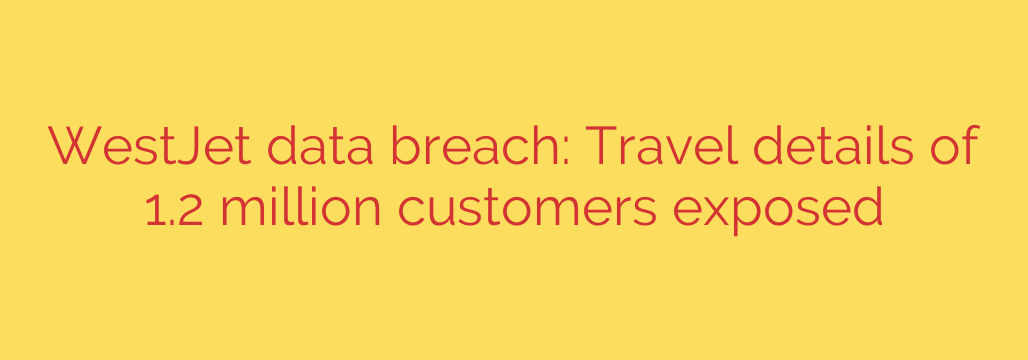
WestJet Data Breach: What to Do If Your Travel Information Was Exposed
A significant data breach has impacted WestJet, exposing the personal and travel details of over a million customers. The incident highlights the growing threat of cyberattacks in the travel industry and underscores the need for passengers to remain vigilant about their personal information.
If you have flown with WestJet, this breach could directly affect you. Here is a clear breakdown of what happened, the potential risks you face, and the critical steps you should take to protect yourself.
What Information Was Compromised?
The security incident was not a direct attack on WestJet’s primary systems but stemmed from a breach at a third-party vendor responsible for managing some of the airline’s data. This distinction is important, as it helps clarify the scope of the exposed information.
According to reports, the compromised data includes a range of sensitive travel details. For over 1.2 million customers, the following information may have been exposed:
- Full names of passengers
- Email addresses and phone numbers
- Unique flight booking reference numbers
- Specific flight details, including dates and destinations
Crucially, it has been reported that highly sensitive financial information, such as full credit card numbers and personal banking details, was not part of this breach. However, the exposed travel data is more than enough for cybercriminals to launch sophisticated and highly targeted attacks.
The Real Risk: Targeted Phishing and Scams
While the absence of financial data might seem reassuring, the combination of your name, contact information, and specific flight details creates a perfect storm for convincing scams. Cybercriminals can use this information to craft fraudulent communications that appear legitimate.
The primary threat is sophisticated phishing attacks. Imagine receiving an email or text message that looks exactly like an official communication from WestJet. It might include your real name, your correct booking reference number, and your upcoming flight time. The message could urgently ask you to:
- Click a link to “confirm your flight details” due to a system error.
- Enter payment information to “upgrade your seat” or “pay for extra baggage.”
- Download an attachment disguised as your “new itinerary” or “boarding pass.”
Because the message contains accurate personal information, you are far more likely to trust it. This is how scammers can trick you into revealing passwords, financial information, or installing malware on your device.
Actionable Steps to Protect Your Information
In the wake of this breach, taking proactive steps is essential to safeguard your personal and financial security.
Treat All Unsolicited Communications with Extreme Caution: Be highly skeptical of any unexpected email, text, or phone call claiming to be from WestJet or any other travel company. Do not click on links or download attachments from these messages. If you need to check on a flight, manually type
westjet.cominto your browser or use the official mobile app.Verify Any Request for Information: Legitimate companies will rarely ask for sensitive information like passwords or full credit card numbers via email. If you receive a request that seems suspicious, contact the company directly through a verified phone number or support channel listed on their official website.
Enhance Your Account Security: Although passwords were not reported as compromised in this specific breach, it serves as a critical reminder to practice good digital hygiene. Use strong, unique passwords for all your online accounts, especially for travel and financial websites. Enable two-factor authentication (2FA) wherever possible for an added layer of security.
Monitor Your Financial Accounts: Keep a close eye on your bank and credit card statements for any unusual or unauthorized activity. If you spot anything suspicious, report it to your financial institution immediately.
Inform Your Family: If you booked flights for family members, their information may also be exposed. Make sure they are aware of the breach and understand the risks of potential phishing scams targeting them.
Staying informed and acting cautiously is your best defense against those who would exploit your stolen data. While companies have a responsibility to protect our information, we must also be prepared to defend ourselves when those systems fail.
Source: https://www.bleepingcomputer.com/news/security/westjet-data-breach-exposes-travel-details-of-12-million-customers/








